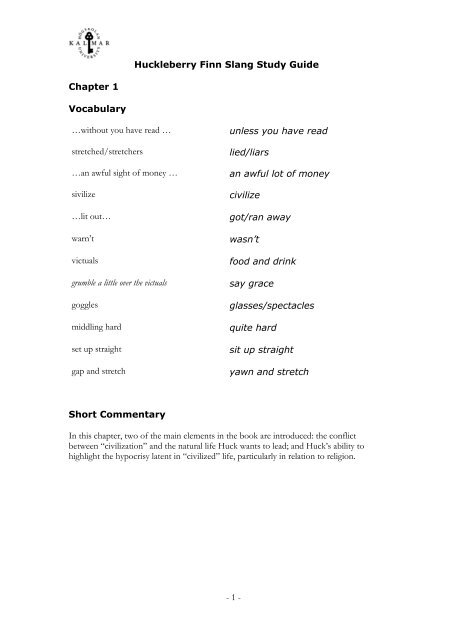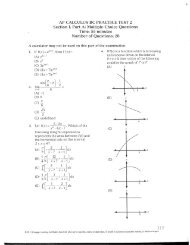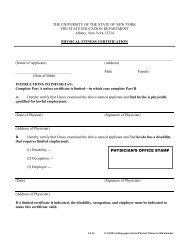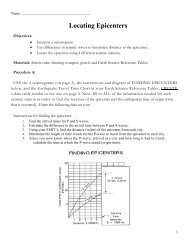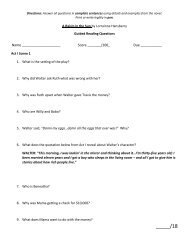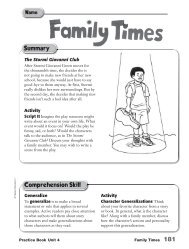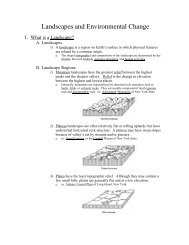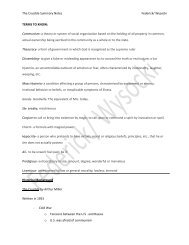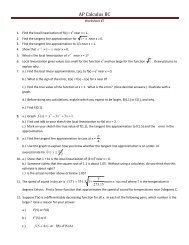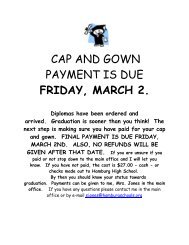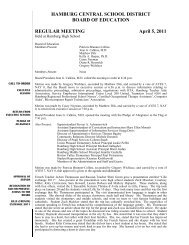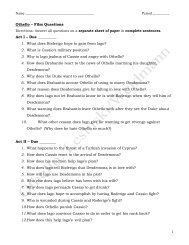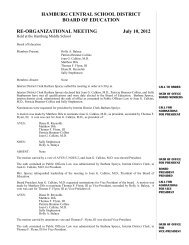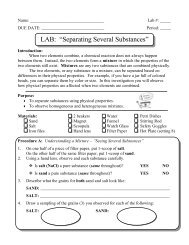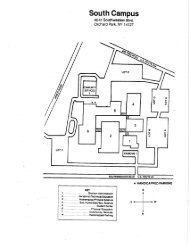Huck Finn Slang Vocabulary - Hamburg Central School District
Huck Finn Slang Vocabulary - Hamburg Central School District
Huck Finn Slang Vocabulary - Hamburg Central School District
Create successful ePaper yourself
Turn your PDF publications into a flip-book with our unique Google optimized e-Paper software.
Chapter 1<br />
<strong>Vocabulary</strong><br />
<strong>Huck</strong>leberry <strong>Finn</strong> <strong>Slang</strong> Study Guide<br />
…without you have read … unless you have read<br />
stretched/stretchers lied/liars<br />
…an awful sight of money … an awful lot of money<br />
sivilize civilize<br />
…lit out… got/ran away<br />
warn’t wasn’t<br />
victuals food and drink<br />
grumble a little over the victuals say grace<br />
goggles glasses/spectacles<br />
middling hard quite hard<br />
set up straight sit up straight<br />
gap and stretch yawn and stretch<br />
Short Commentary<br />
In this chapter, two of the main elements in the book are introduced: the conflict<br />
between “civilization” and the natural life <strong>Huck</strong> wants to lead; and <strong>Huck</strong>’s ability to<br />
highlight the hypocrisy latent in “civilized” life, particularly in relation to religion.<br />
- 1 -
Chapter 2<br />
<strong>Vocabulary</strong><br />
scrouched down crouched down<br />
Who dah? Who’s there?<br />
could a touched him could have touched him<br />
I dasn’t I daren’t<br />
with the quality with finer folk<br />
ef if<br />
sumf’n something<br />
I’s gwyne I’m going to<br />
betwixt between<br />
resk risk<br />
…his back was all over saddle-boils … he had saddle sores all over his<br />
back<br />
high-toned posh, fancy<br />
hain’t he hasn’t he<br />
bothersome troublesome<br />
clumb climbed<br />
clayey covered in clay<br />
Short Commentary<br />
The weaknesses in Tom Sawyer’s character and ideas are brought out in this chapter.<br />
The question is: why do the boys go along with it? At the moment, you could say that<br />
this is a child-like quality, but look out for it later.<br />
Notice also the similarities between the processes by which Jim inflates the story about<br />
witches, and the way the boys ‘wind up’ the oath they all have to swear.<br />
- 2 -
Chapter 3<br />
<strong>Vocabulary</strong><br />
ornery difficult<br />
whale me beat me<br />
hog-drovers people who herd pigs<br />
‘julery’ jewellery<br />
pow-wow discuss<br />
ambuscade ambush<br />
primer-class the youngest class in a Sunday<br />
school<br />
tract religious essay<br />
numskull idiot<br />
hash you up beat you up<br />
lick the other crowd beat the other crowd<br />
sap head idiot<br />
Short Commentary<br />
“It had all the marks of a Sunday <strong>School</strong>.” Which side does <strong>Huck</strong> stand? Does he believe<br />
in Tom, or not? Is it credible that he can consistently see through Tom’s stories, but still<br />
keep rubbing lamps?<br />
- 3 -
Chapter 4<br />
<strong>Vocabulary</strong><br />
uncommon tired extremely tired<br />
played hookey played truant<br />
the hiding I got the beating I got<br />
they warn’t so raspy on me they didn’t irritate me so much<br />
clumb climbed<br />
old slick counterfeit quarter a fake 25¢ which was greasy to<br />
the touch (because it was made<br />
of inferior metal)<br />
a-gwyne going<br />
spec expects<br />
at de las’ in the end<br />
hirt hurt<br />
po’ poor<br />
by-en-by in due course of time/after a<br />
while<br />
fum from<br />
kin can<br />
resk risk<br />
‘kase because<br />
set sat<br />
Short Commentary<br />
<strong>Huck</strong> sees some tracks in the snow – and notices something special about the boot-heels<br />
of the person who made them. He rushes across to the Judge and divests himself of all<br />
his money (selling them to Judge Thatcher for a dollar), and then tries to divine the<br />
future with Jim’s help. Why?<br />
- 4 -
Chapter 5<br />
<strong>Vocabulary</strong><br />
sort of hitched almost stopped<br />
an old black slouch a kind of ‘cowboy’ hat<br />
starchy posh<br />
You’ve put on considerble many frills you’ve become quite refined<br />
I’ll take you down a peg I’ll make you know your place<br />
hifalut’n fancy<br />
I’ll learn people I’ll teach people<br />
lemme let me<br />
I’ll tan you good I’ll give you a good beating<br />
yaller yellow<br />
give you a cowhide beat you<br />
shell it out hand it over<br />
bullyragged shouted at<br />
he’d make it warm for him he’d beat him<br />
was just old pie treated him nicely<br />
temperance abstinence from alcohol<br />
afeard afraid<br />
stanchion a metal rod running down the<br />
outside of the building<br />
forty rods 1 rod = 5.0292 m<br />
had to take soundings before they could<br />
navigate it<br />
i.e. it was knee deep in mess (a<br />
sounding is a measurement of<br />
the depth of water under a ship)<br />
- 5 -
Short Commentary<br />
There’s a lot in this chapter about the hostility which existed between the uneducated<br />
and the educated at the time, and about the naivety of ‘do-gooders’. Why do you think<br />
this hostility existed?<br />
Chapter 6<br />
<strong>Vocabulary</strong><br />
raised Cain caused a lot of trouble<br />
game birds (for eating)<br />
licked me beat me<br />
too handy with his hick’ry beat me too much<br />
welts swellings caused by being<br />
beaten<br />
chimbly chimney<br />
for wadding wadding was used in muzzleloading<br />
guns to stop the ball<br />
from rolling out and to compress<br />
the charge so that the ball<br />
would go further.<br />
toted carried<br />
some lines some fishing lines<br />
hollered shouted<br />
suthin’ something<br />
anear near<br />
mulatter mulatto (i.e. someone with both<br />
white and black ancestors)<br />
- 6 -
nabob literally, a high official in a<br />
Muslim country – here a term of<br />
abuse for a black person seen to<br />
be ‘above himself’<br />
set stock-still sit absolutely still<br />
piling it on exaggerating<br />
Short Commentary<br />
Now <strong>Huck</strong>’s been abducted by his father. His life in the cabin isn’t very pleasant – but it<br />
does have its advantages, according to <strong>Huck</strong>. What are they and why do you think that<br />
<strong>Huck</strong> is ambivalent about being rescued by the Judge and Miss Watson?<br />
Chapter 7<br />
<strong>Vocabulary</strong><br />
roust me out wake me up<br />
palavering talking<br />
cord-wood 1 cord = 3.62 cu. m. This wood<br />
is thus sawn timber which has<br />
drifted loose.<br />
skillet frying pan<br />
a bag of meal a bag of flour<br />
whetstone a stone used for sharpening<br />
tools<br />
rowlocks the brackets on the boat oars fit<br />
into<br />
ripped out something brisk swore at them<br />
the dead water the calm water in the lee of the<br />
island<br />
- 7 -
Short Commentary<br />
This is the story of <strong>Huck</strong>’s escape from his father’s custody. Notice that he refers to<br />
Tom Sawyer as he’s making his preparations. What do you think about the contrast<br />
between Tom Sawyer’s way of thinking and acting, and <strong>Huck</strong>’s way of making his<br />
escape?<br />
Chapter 8<br />
<strong>Vocabulary</strong><br />
quicksilver mercury<br />
baker’s bread … none of your low-down<br />
corn-pone<br />
deef deaf<br />
haggled cut (roughly)<br />
ef if<br />
bread baked with wheat flour<br />
and yeast, rather than<br />
sourdough-baked maize bread<br />
Honest injun a way of indicating that you’re<br />
telling the truth<br />
low down Ablitionist a disgusting Abolitionist (i.e.<br />
someone who advocating ending<br />
slavery)<br />
keeping mum keeping quiet<br />
pooty pretty<br />
down to Orleans down the Mississippi to New<br />
Orleans (which was one of the<br />
central slave markets)<br />
nigger trader a travelling buyer and seller of<br />
slaves<br />
oneasy uneasy<br />
do’ door<br />
- 8 -
shet shut<br />
lit out ran away<br />
shin down de hill … ‘bove de town ran down the hill expecting to<br />
steal a skiff along the shore<br />
somewhere upstream of the<br />
town<br />
cooper shop barrel-makers<br />
shavins wood shavings and sawdust in a<br />
pit in the barrel-makers’<br />
workshop<br />
camp-meetn prayer meeting out in the open<br />
air<br />
p’int point (a spit of land sticking out<br />
into the river)<br />
raff raft<br />
tuck ahold took hold<br />
bank too bluff the bank was too steep<br />
specalat’n speculating<br />
one-laigged one-legged<br />
sot set<br />
ketched acquired (caught)<br />
Balum’s Ass Balaam’s Ass (a donkey in the<br />
Bible owned by the Gentile<br />
soothsayer, Balaam, who<br />
complained when his master<br />
beat him unjustly)<br />
chuckle-heads idiots<br />
k’leck collect<br />
squah square (i.e. even)<br />
- 9 -
Short Commentary<br />
<strong>Huck</strong> meets up with Jim and finds out why Jim has run away from Miss Watson. He also<br />
finds out how Jim escaped. Both Jim and <strong>Huck</strong> tend to make light of the way they<br />
managed to cope with the difficulties they face – are they right to do this?<br />
Chapter 9<br />
<strong>Vocabulary</strong><br />
tolerable long steep hill quite a long steep hill<br />
frame house a wooden house (built around a<br />
timber frame with panelling on<br />
the outside)<br />
gashly ghastly<br />
calico cheap cotton<br />
two bits 25¢<br />
reticule a small bag used by ladies for<br />
keeping sewing articles in<br />
vials of medicine glass tubes with medicine in<br />
curry-comb a comb used to brush horses<br />
Short Commentary<br />
The search of the frame house is going to be very important later on in the story. Can<br />
you work out why?<br />
Chapter 10<br />
<strong>Vocabulary</strong><br />
a-ha’nting haunting (as a ghost)<br />
planted and comfortable buried properly<br />
rummaged searched<br />
- 10 -
lanket overcoat an overcoat made of thick,<br />
blanket material<br />
peart cocky<br />
I’d druther I’d rather<br />
rubbage rubbish<br />
the joint of a stove pipe i.e. you couldn’t see anything by<br />
looking under <strong>Huck</strong>’s bonnet<br />
britches trousers<br />
Short Commentary<br />
This is one of the chapters in which Twain pokes fun at the superstitious nature of<br />
<strong>Huck</strong>, Jim and many of their contemporaries. How does he do this?<br />
Chapter 11<br />
<strong>Vocabulary</strong><br />
Take a cheer take a chair<br />
hain’t haven’t<br />
what a hard lot he was what a bad person he was<br />
boo-hooing protesting<br />
sence since<br />
I let drive I threw (the lump of lead)<br />
hive throw<br />
‘prentice apprentice (apprentices had to<br />
sign a contract that they would<br />
stay with their masters until<br />
they were 21, and the only<br />
simple way to break that<br />
contract was to run away –<br />
which was against the law)<br />
- 11 -
to cut to run away<br />
blinders the flaps of leather which shield<br />
a horse’s eyes, so that it can<br />
only look forwards (and thus not<br />
be frightened in crowds)<br />
Short Commentary<br />
This is a classic chapter. Twain manages to move the plot along in a very witty, but<br />
elegant way. How?<br />
Chapter 12<br />
<strong>Vocabulary</strong><br />
harrow a farming implement used to<br />
break up the soil after ploughing<br />
mushmelon honeydew melon<br />
punkin pumpkin<br />
chimbly-guy the wires which hold the<br />
smokestack upright<br />
wrack wreck<br />
seegars cigars<br />
derrick a sort of crane used to load and<br />
unload the boat with<br />
a-biling boiling<br />
betwixt between<br />
orter ought to<br />
Shore’s as sure as<br />
turn State’s evidence give evidence against his<br />
companions in return for a<br />
lighter sentence himself<br />
- 12 -
court’n around after a halter risking being hanged<br />
pickins pickings (i.e. loot)<br />
Short Commentary<br />
This is another key chapter in the book. Take note of the contrast between Jim’s sense<br />
and <strong>Huck</strong>’s recklessness. Why do you think this chapter will turn out to be important?<br />
Chapter 13<br />
<strong>Vocabulary</strong><br />
paddle-box the cover over the steamship’s<br />
paddle<br />
cretur creature<br />
beatenest most extraordinary<br />
who in the dingnation who on earth<br />
rapscallions rascals<br />
Short Commentary<br />
Notice how inventive <strong>Huck</strong> is in making up plausible stories. What do you think inspired<br />
him to add the details which made the ferry-boat captain go and look for the wreck?<br />
- 13 -
Chapter 14<br />
<strong>Vocabulary</strong><br />
spyglass telescope<br />
prime excellent<br />
skasely scarcely<br />
k’yards cards<br />
bo’d’n house boarding house (i.e. cheap<br />
hotel)<br />
rackety times lots of arguments and noise<br />
nussery nursery<br />
blimblammin’ arguing<br />
biler-factry boiler factory<br />
k’yer care<br />
Bofe un both of<br />
had any gumption had any sense or initiative<br />
pints points<br />
‘spute dispute<br />
mine you mind you<br />
furder further<br />
waseful wasteful<br />
diffunt different<br />
warn’t no consekens was no great matter<br />
cain’t get no situation can’t get a job<br />
- 14 -
I be ding-busted! I’ll be damned<br />
jabber talk<br />
Polly-voo-franzy Parlez-vous français? (Do you<br />
speak French?)<br />
‘low allow<br />
mos’ sholy most surely<br />
Short Commentary<br />
The introduction of the concept of royalty and aristocracy will become important later<br />
too. <strong>Huck</strong>’s conclusion is that it’s Jim who is being illogical about the existence of<br />
French. Is this actually the case?<br />
Chapter 15<br />
<strong>Vocabulary</strong><br />
dead brush dead bushes<br />
Jack-o-lantern wisp of marsh gas (methane)<br />
which had ignited (also, in<br />
popular folklore, a spirit of the<br />
dead hanging around a marsh)<br />
snag a branch sticking up out of the<br />
water<br />
cat-nap short doze<br />
tangle-headed confused<br />
dog my cats (an expression of amazement)<br />
humble myself apologize<br />
Short Commentary<br />
This is a dramatic incident – and it also illustrates the changing relationship between<br />
<strong>Huck</strong> and Jim. In what way do you think their relationship changes?<br />
- 15 -
Chapter 16<br />
<strong>Vocabulary</strong><br />
lightning bugs fireflies<br />
staid stayed<br />
ell an obsolete measurement of<br />
length (approx. 94 cms)<br />
coming right out flat-footed stating plainly<br />
doan’ less’ talk don’t let’s talk<br />
it was all up with Cairo the option of changing rivers at<br />
Cairo had been missed<br />
sheering off turning away<br />
clum climbed<br />
Short Commentary<br />
<strong>Huck</strong>’s crisis of conscience is a very important incident in the book. The contrast<br />
between the way his culture expects him to act and the way he wants to act is very sharp.<br />
What exactly would the consequences of not turning Jim in be for <strong>Huck</strong>?<br />
Chapter 17<br />
<strong>Vocabulary</strong><br />
parlor best room<br />
rag carpet hand-made carpet made out of<br />
bits of old clothes<br />
… frowsy-headed … his hair was in a mess<br />
cob pipes pipes made out of corn cobs<br />
(maize)<br />
… trimmed down to nothing … (he had become very thin)<br />
- 16 -
deck passage the cheapest way of travelling<br />
by river boat (sleeping on the<br />
deck)<br />
It ain’t no slouch of a name to spell<br />
It’s a difficult name to spell<br />
brass dog irons brass implements used to hold<br />
up logs being burned on a fire<br />
peddlers travelling handymen<br />
tuckered out worn out<br />
split-bottom chairs chairs with a woven cane seat<br />
wee small<br />
reticule small cloth bag used for keeping<br />
sewing implements in<br />
betwixt between<br />
bushels lots<br />
Short Commentary<br />
In this chapter the Grangerfords and the Shepherdsons are introduced. Notice how<br />
approving <strong>Huck</strong> is of everything about the Grangerfords. Notice too the emphasis on<br />
death!<br />
Chapter 18<br />
<strong>Vocabulary</strong><br />
junketings parties<br />
kin-folks relatives<br />
high-toned upper class<br />
pommel raised part at the front of the<br />
saddle<br />
som’ers along there around that time<br />
- 17 -
lame’ foolishness complete stupidity<br />
ornery irritating<br />
preforeordestination <strong>Huck</strong>’s attempt to say<br />
‘predestination’, or ‘ordination’<br />
ransacked it searched it thoroughly<br />
flinders splinters<br />
sich punkin heads such idiots<br />
crick creek<br />
fambly family<br />
Short Commentary<br />
The contrast between the practices and characters of the white people and the negroes is<br />
brought out very clearly in this chapter, as is the contrast between life on the raft and life<br />
ashore.<br />
The question this chapter brings up is: what is moral behavior? Jim shows once again<br />
that he behaves altruistically, risking capture and re-enslavement in order to make sure<br />
that <strong>Huck</strong> is safe.<br />
Chapter 19<br />
<strong>Vocabulary</strong><br />
sweep long oar<br />
snag submerged piece of wood just<br />
sticking up above the surface of<br />
the water<br />
scow small trading boat<br />
chimbley chimney<br />
pow-wow noise<br />
hove out thrown out<br />
- 18 -
as tight as they could foot it as fast as they could run<br />
britches trousers<br />
galluses a type of sock<br />
carpet bag bag made of an old carpet sewn<br />
together<br />
temperance revival teetotal meeting<br />
mesmerism hypnotism<br />
phrenology describing someone’s character<br />
by feeling the bumps on their<br />
head<br />
nation sorry very sorry<br />
Dauphin the eldest son of a king of<br />
France<br />
huffy in a bad mood<br />
Short Commentary<br />
In this chapter we meet the King and the Duke for the first time. <strong>Huck</strong> makes it clear<br />
that he sees through them, but his comment at the end of the chapter is very significant<br />
for what follows. Is <strong>Huck</strong> ever taken in by them?<br />
Chapter 20<br />
<strong>Vocabulary</strong><br />
one-horse place a very small, poor farm<br />
ketched caught<br />
cipher out work out<br />
would a sejested would have suggested<br />
fitten fitting<br />
the histrionic muse is the darling<br />
I like acting best of all<br />
- 19 -
trod the boards acted<br />
country jakes country bumpkins (fools)<br />
linsey-woolsey/gingham/calico different kinds of cloth<br />
lining out a hymn teaching the crowd to sing a<br />
hymn by singing a line or two<br />
and having them sing after him<br />
contrite repentant<br />
swabbing wiping<br />
preserve the unities a reference to the classical style<br />
of drama<br />
Short Commentary<br />
We see the King and the Duke in action for the first time. Note the description of the<br />
religious meeting.<br />
Chapter 21<br />
<strong>Vocabulary</strong><br />
rusty in a bad way (hung-over)<br />
chippered them up freshened them up/woke them<br />
up<br />
languishy sweetly and longingly<br />
oak laths thin, flat pieces of wood<br />
highland fling/sailor’s hornpipe two dances<br />
shackly<br />
ramshackle<br />
chaw piece of chewing tobacco<br />
on salary being paid for it<br />
chaw up beaten<br />
- 20 -
sassed argued with<br />
spoon vittles soft food<br />
ca’m calm<br />
blackguarding Sherburn slandering Sherburn<br />
lynched hanged<br />
Short Commentary<br />
This chapter describes a typical small Southern town, and its inhabitants. Colonel<br />
Sherburn is the best man in the town, a flower of Southern chivalry, and the Boggs<br />
incident shows such a flower doing his best work.<br />
Chapter 22<br />
<strong>Vocabulary</strong><br />
bucks and wenches male and female slaves<br />
skaddle run<br />
palings fence<br />
sot drunkard<br />
Short Commentary<br />
Colonel Sherburn’s indictment of Southern men is a very significant statement. To what<br />
extent do you think it reflects Twain’s own view of the nature of the white people. Note<br />
Sherburn’s comments about Northerners - Twain himself was a Southerner who went to<br />
live in the North.<br />
The description of the circus is one of the commonest extracts from <strong>Huck</strong>leberry <strong>Finn</strong>.<br />
Chapter 23<br />
<strong>Vocabulary</strong><br />
it was too various for me it smelled too strong<br />
like the dickens was after you like the devil was after you<br />
- 21 -
greenhorns beginners<br />
butt of mamsey (a butt of malmsey) a barrel of<br />
wine (in which the Duke of<br />
Clarence was murdered)<br />
fo’ year ole four years old<br />
sk’yarlet-fever<br />
scarlet fever<br />
shet de do’ shut the door<br />
I lay I make you mine I swear I’ll make you mind (pay<br />
attention/care)<br />
deef en dumb deaf and dumb<br />
Short Commentary<br />
We have just seen white, free society at its worst, and this chapter begins with a<br />
discussion about the nature of kings (presumably the ‘cream’ of society). Twain then<br />
exposes us to a recollection Jim has of his family. <strong>Huck</strong>’s comment on p. 218 is very<br />
revealing (“… I do believe he cared just as much for his people as white folks does for<br />
their’n. It don’t seem natural, but I reckon it’s so.”).<br />
Both the Grangerfords and Colonel Sherburn pay a lot of lip-service to morality. How<br />
does theirs measure up against Jim’s?<br />
Chapter 24<br />
<strong>Vocabulary</strong><br />
beaver a kind of hat<br />
toting carrying<br />
the ones that Peter was thickest with<br />
Peter’s closest friends<br />
dissentering minister Dissenting Minister (Baptist, or<br />
Methodist, for example)<br />
Short Commentary<br />
“The clothes make the man” - you see the King and the Duke preparing their next scam.<br />
- 22 -
Chapter 25<br />
<strong>Vocabulary</strong><br />
the King hunched the Duke the King gave the Duke a sign<br />
leak weep<br />
flapdoodle nonsense<br />
doxolojer doxology<br />
to-wit/vizz namely<br />
passel of sapheads<br />
a bunch of idiots<br />
yaller-boys gold pieces<br />
furrin foreign<br />
deffisit deficit<br />
the boss dodge the best trick<br />
the vale of sorrers the vale of sorrows (this wordly<br />
life)<br />
lingo language<br />
prime good hit a good reply<br />
Short Commentary<br />
This is the beginning of the incident with the Wilks’ family. The King and the Duke<br />
behave in their usual way, and set up a situation where they themselves are the losers.<br />
Chapter 26<br />
<strong>Vocabulary</strong><br />
up garret up in the attic<br />
cubby alcove<br />
- 23 -
pallet rough, straw bed<br />
stretcher lies<br />
reptle reptile<br />
Short Commentary<br />
Here we see <strong>Huck</strong> fashioning his own form of morality in the face of the conventions of<br />
both the cheats and the respectable people around in him.<br />
Chapter 27<br />
<strong>Vocabulary</strong><br />
remainders remains<br />
resk risk<br />
smouch it steal it<br />
the beats (here) the King and the Duke<br />
skreeky and colicky (the melodium sounded shrill<br />
and as if it had hiccups)<br />
pison long<br />
rubbage rubbish<br />
hogged stolen<br />
extremely long<br />
dad fetch the whole business damn the whole business<br />
histrionic talent acting talent<br />
Short Commentary<br />
Twain extracts a great deal of comedy from the scene where the undertaker goes out to<br />
quieten down the dog.<br />
- 24 -
Chapter 28<br />
<strong>Vocabulary</strong><br />
hair trunk a trunk made of compressed<br />
horsehair<br />
a-biling boiling (with anger)<br />
she was just full of sand she had guts<br />
mumps/measles/whooping<br />
cough/erysiplas/consumption/yaller<br />
janders/brain fever<br />
muggins fool<br />
Short Commentary<br />
different kinds of disease<br />
Compare <strong>Huck</strong>’s plan to get the girls off the hook with Tom’s to get Jim freed at the end<br />
of the book.<br />
Chapter 29<br />
<strong>Vocabulary</strong><br />
complices accomplices<br />
it’s his hand you’ve got there that’s in his hand-writing<br />
Short Commentary<br />
This chapter contains the end of the Wilks’ episode.<br />
Chapter 30<br />
<strong>Vocabulary</strong><br />
aholt hold<br />
Heel it Run for it<br />
- 25 -
Leggo the boy Let go of the boy<br />
penitentiary federal jail<br />
cravats (here) hangman’s nooses<br />
Short Commentary<br />
Note the change of attitude of the King and the Duke towards <strong>Huck</strong> and Jim.<br />
Chapter 31<br />
<strong>Vocabulary</strong><br />
yellocution elocution (the art of speaking<br />
properly)<br />
don’t work your jaw don’t tell anyone about us<br />
get entirely shut of them get rid of them for good<br />
Short Commentary<br />
In this chapter, <strong>Huck</strong>’s moral dilemma about seeing Jim either as Miss Watson’s property<br />
(and thus making himself guilty of theft), or as a fellow human-being, comes to a head.<br />
His choice is unequivocal, but does it make him morally bad (and bound for hell)?<br />
Chapter 32<br />
<strong>Vocabulary</strong><br />
mortification gangrene (rot)<br />
out a piece in the country a little way out into the country<br />
pump them a little question them closely<br />
I druther I’d rather<br />
Short Commentary<br />
The description of the Phelps’ place is very detailed - why? Note the reaction of Mrs<br />
Phelps to the news that the supposed steamboat explosion killed a negro.<br />
- 26 -
Chapter 33<br />
<strong>Vocabulary</strong><br />
staid stayed<br />
ha’nt haunt<br />
I hain’t come back I haven’t come back<br />
keep mum don’t say anything<br />
I let go all holts I was completely amazed<br />
store clothes best clothes (bought in a shop,<br />
rather than home-made)<br />
that was always nuts to Tom Sawyer<br />
Tom Sawyer always thrived on<br />
that<br />
to meeky along up that yard to come quietly and humbly up<br />
the yard<br />
owdacious (audacious) bold<br />
spinning-stick implement used to spin yarn<br />
from wool<br />
ther’ll be an idiot short there’ll be one less idiot<br />
Methusalem-numskull the oldest fool (referring to<br />
Methusaleh - the oldest man in<br />
the Bible)<br />
impudent whelps cheeky young puppies<br />
putrified (petrified) turned into stone<br />
smack kiss<br />
pison poison<br />
- 27 -
Chapter 34<br />
<strong>Vocabulary</strong><br />
britches trousers<br />
bullinesses bits of bravado<br />
tit-tat-toe, three in a row children’s games<br />
lean-to a small extension to a building,<br />
built up against the side of it<br />
chuckle-headed stupid<br />
scole me scold me (tell me off)<br />
Short Commentary<br />
This is where the contrast between <strong>Huck</strong>’s sensible escape plans and Tom’s increasingly<br />
far-fetched ones becomes clear. The question is, though, why does <strong>Huck</strong> go along with<br />
them?<br />
Chapter 35<br />
<strong>Vocabulary</strong><br />
resky risky<br />
seneskal (seneschal) watchman<br />
vassles (vassals) servants<br />
et eaten<br />
clew clue<br />
hickry-bark wooden<br />
pewter (tenn)<br />
donjon-keep dungeon keep (prison in the<br />
main tower of a castle)<br />
- 28 -
captivated being held prisoner<br />
spos’n supposing<br />
gold-leaf distinctions useless details<br />
smouch steal<br />
sejest suggest<br />
weatherboarding planks nailed horizontally across<br />
the outside walls of a house to<br />
add protection from the weather<br />
Short Commentary<br />
Tom now goes off on a flight of fancy, based on all sorts of adventure stories he has<br />
read over the years. At the same time, he knows full well that this is all a game. <strong>Huck</strong>, on<br />
the other hand, takes the situation seriously (as far as he knows, it is), but once again,<br />
consistently fails to put up any argument at all in favour of his highly practical ideas<br />
against Tom’s ridiculous ones … why is this?<br />
Chapter 36<br />
<strong>Vocabulary</strong><br />
counterpin (counterpain) coverlet on the<br />
bed<br />
cold chisel a tool used (with a hammer) to<br />
break bricks, stones or pieces of<br />
metal<br />
chawed chewed<br />
wusshup worship<br />
Short Commentary<br />
The episode with the case knife shows the extent of Tom’s own hypocrisy (which <strong>Huck</strong><br />
interprets as noble feelings!). Bear in mind, though, that whilst this is all a game for Tom,<br />
<strong>Huck</strong> and Jim are running real risks. <strong>Huck</strong> is involved in theft (which will be punished<br />
severely, since his character is so bad), and Jim is in imminent risk of losing his freedom<br />
again (and probably never seeing his family again).<br />
- 29 -
Chapter 37<br />
<strong>Vocabulary</strong><br />
sluicing out pouring out<br />
around the gills in the face<br />
wool-gethering memory (wool-gathering) a memory<br />
which only collects useless bits<br />
of information in an<br />
unsystematic way<br />
I’ve been remiss I’ve neglected things I should<br />
have done<br />
yistiddy yesterday<br />
go for the woods till the weather<br />
moderated<br />
nigh me near me<br />
Short Commentary<br />
get out of the way until she had<br />
calmed down<br />
Once again, we see the quickness of Tom Sawyer’s wits … but there is still the question<br />
of how a character who is so sensible and rational can be so consistently irrational (is he<br />
too old for all these fantasies he has?), and why <strong>Huck</strong> just goes along with it.<br />
Chapter 38<br />
<strong>Vocabulary</strong><br />
distressid-tough (distressingly tough) very<br />
difficult<br />
scrabble scratch<br />
scutcheon/bend or/dexter base/satire<br />
murrey/couchant/common<br />
charge/chevron vert/chief<br />
engrailed/invected lines/field<br />
azure/nombril points/rampant/dancette<br />
indented/sable/bar sinister/gules<br />
Twain using heraldry terms to<br />
make fun of Tom’s pretensions<br />
- 30 -
didn’t give my hands no show to get rid of<br />
the sores<br />
pint point<br />
twyste twice<br />
Short Commentary<br />
didn’t give my blisters on my<br />
hands a chance to heal<br />
Notice the ridiculous scene where Jim breaks out of the cabin to help Tom and <strong>Huck</strong> get<br />
the grindstone in!<br />
Chapter 39<br />
<strong>Vocabulary</strong><br />
we like-to we would have liked to<br />
allycumpain a plant which takes away the<br />
pain of hornet stings!<br />
nonnamous anonymous<br />
mullet-headed stupid<br />
togs clothes<br />
leasure<br />
Short Commentary<br />
leisure<br />
There are some fine comic scenes, when Aunt Sally finds the snakes, for example, which<br />
were exactly what Twain’s readers liked.<br />
Chapter 40<br />
<strong>Vocabulary</strong><br />
Injun file (Indian file) one after the other<br />
in a line<br />
- 31 -
Short Commentary<br />
Compare once again Jim’s reaction to Tom’s getting a bullet in his leg, with that of the<br />
white people in similar situations.<br />
Chapter 41<br />
<strong>Vocabulary</strong><br />
gunnel the edge of the canoe<br />
natcherl natural<br />
sasser o ’m’lasses saucer of molasses<br />
I ‘low I’d take ‘n’ lash ‘m t’ll I think I’d whip them until …<br />
brown study she sat quietly and day-dreamed<br />
(in a depressed way)<br />
Chapter 42<br />
<strong>Vocabulary</strong><br />
nuss nurse<br />
getting pretty sultry for us getting warm for us (i.e. we<br />
were getting into trouble)<br />
ruputation reputation<br />
Chapter the Last<br />
<strong>Vocabulary</strong><br />
gwineter going to<br />
- 32 -


